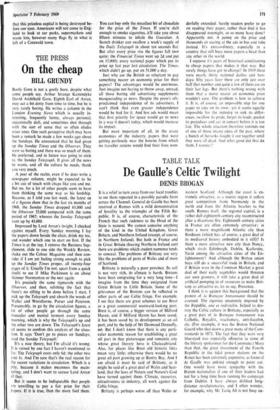On the cheap
THE PRESS BILL GRUNDY
Boofy Gore is not a goofy bore, despite what some people say. Arthur Strange Kattendyke David Archibald Gore, Eighth Earl of Arran, may act a bit dotty from time to time, but he is very rarely boring. He writes a column in the London Evening News which is usually in- teresting, frequently funny, always personal, occasionally daft; and sometimes shot through with the sort of sense that so often eludes
wiser ones. One such perceptive shaft may have been a remark he made a few weeks ago about
the Sundays. He announced that he had given up the Sunday Times and the Observer. They were so boring and there was so much of them.
He preferred, and in future was going to stick to. the Sunday Telegraph. It gives all the news he wants, and all the culture he needs, thank you very much.
A peer of the realm, evert if he does write a newspaper column, might be expected to be a bit out of touch with chaps like you and me.
But no, for a lot of other people seem to have been thinking the same way as his lordship.
Because, as I told you last week, the latest AB
of c figures show that in the last six months of 1968, the Sunday Times dropped 61,000 and the Observer 55,000 compared with the same period of 1967; whereas the Sunday Telegraph went up by 43,000.
Impressed by Lord Arran's insight, I checked against myself. Every Sunday morning I lay' the papers down beside the chair, drink my tea, and wonder which one to start on first. If the Times is at the top, I remove the Business Sup- plement, slide to one side the Weekly Review,
shake out the Colour Magazine and then con- sider if I am yet feeling strong enough to pick up the Sunday Times proper, all twenty-four pages of it. Usually I'm not, apart from a quick shufti to see if Mike Parkinson is on abeiut Skinner Normanton or the MCC again.
It's precisely the same rigmarole with the Observer, and then, relishing the fact that there's no sifting to be done before I start, I pick up the Telegraph and absorb the words of Waller and Worsthorne, Purser and Paterson. Presumably, to go by the circulation figures, a lot of other people go through the same muscular and mental torment every Sunday morning, which is why the Telegraph's up and the other two are down. The Telegraph's latest ad seems to confirm this analysis of the situa- tion. It says 'Don't go to pieces on Sundays; read the Sunday Telegraph.
It's a nice theory, but I'm afraid it's wrong. It is ruined by one fact I haven't mentioned so far. The Telegraph costs only 6d; the other two cost ls. And I'm sure that's the real reason for- the recent variations in circulation. Which is a Pity, because it makes meanness the main- spring, and I don't want to accuse Lord Arran' of that.
But it seems to be indisputable that people are unwilling to pay a fair price for their. Papers. If it is true, then the more fool them.
You can buy only the measliest bit of chocolate for the price of the Times. If you're daft enough to smoke cigarettes, it'll take you about fifteen minutes to inhale the Guardian. A Scotch drinker can swallow a week's supply of the Daily Telegraph in about ten seconds flat. But after every price rise the figures fall (not quite; the Financial Times went up 2d and put on 15,000); every national paper which put its price up last year lost circulation. The Times, which didn't go up, put on 51,000 a day.
Just why are the British so reluctant to pay something nearer an economic price for their papers? The advantages would be enormous. Just imagine not having to throw away, unread, all those boring old advertising supplements masquerading as news. Despite the press's oft- proclaimed independence of its advertisers, I can't think that even greater independence would be bad for it. And less ads would mean that first priority for space would go to news in a way it doesn't today, which would increase its impact.
But most important of all, in the crazy economics of the industry, papers that were getting perilously near the bourne from which no traveller returns would find their lives won- derfully extended. Surely readers prefer to go on reading their paper, rather than find it has disappeared overnight, as so many have done? Apparently not. A penny on the price and thousands sit staring at the ads in bus and tube instead. It's extraordinary, especially in a country that still buys more papers a head than any other in the world.
I suppose it's years of historical conditioning to cheap papers that makes it that way. But surely things have got to change? In 1919 there were nearly thirty national dailies and Sun- days; fifty years later there are only just over half that number and quite a few of them are on their last legs. But there's nothing wrong with them that a move nearer an economic price wouldn't cure. The problem is how to achieve it. It is, of course, an impossible step for one paper to take on its own : yet it seems equally impossible for the industry to sink its differ- ences, swallow its pride, forget its feuds, pocket its prejudices and act in concert before it is too late. The whole situation therefore reminds me of one of those insane epics of the past, where a bunch of berserks fought it out together until they were all dead. And what good did that do them, I wonder?






































 Previous page
Previous page